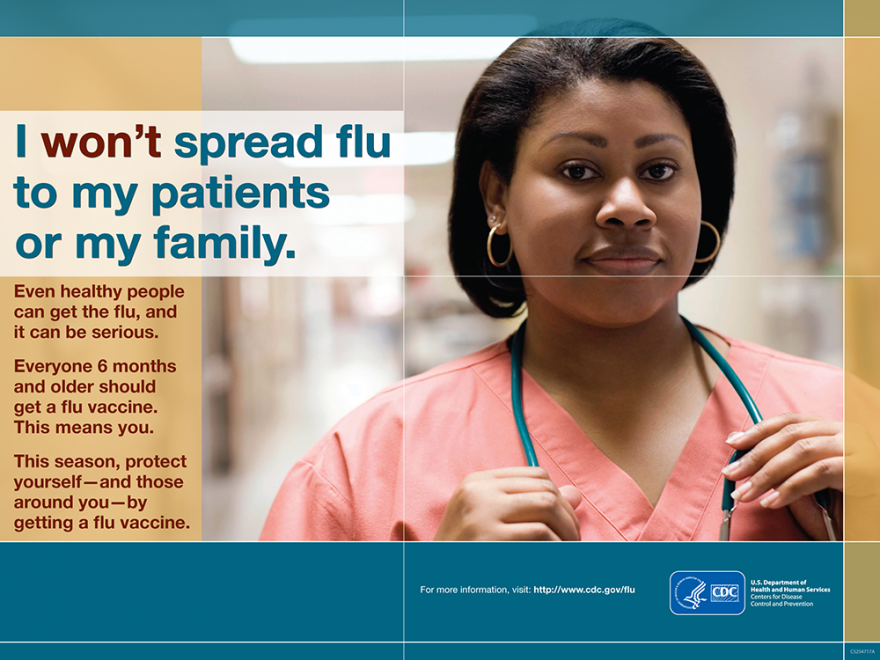Massachusetts has made progress over the last five years in efforts to have staff members in licensed health care facilities vaccinated for flu each year, but there’s still a good deal of room for improvement especially in non-hospital settings.
Many long-term care and other facilities that serve older adults continue to fall short of expectations that 9-out-of-10 staff members will be vaccinated against the flu every year.
Average rates for the 2018-2019 season were 72% of staff in nursing homes, 64% in rest homes and 61% in adult day health programs, according to data from the Massachusetts Department of Public Health. (Rates at assisted living facilities are not tracked by DPH.)
Licensed clinics, which include many imaging, urgent care, counseling, dental, and other clinics, also struggle to reach the 90% goal as did ambulatory surgery centers, dialysis centers and non-acute care hospitals.
In contrast, acute care hospitals have achieved average rates over 90% each year since 2014-2015, with 94% of health care personnel vaccinated for each of the past two seasons.
In Massachusetts, licensed health care facilities are required to offer annual flu vaccination to all personnel free of charge and report staff vaccination data every spring at the end of flu season. The state set an annual goal of 90% of health workers vaccinated against influenza by the year 2020, in accordance with the National Healthy People 2020 campaign.
Education and incentives form one successful strategy
Started by George Bane in 1959, BaneCare Management owns skilled nursing, rehabilitation and other care service facilities across Massachusetts. It has found that combining proactive education with incentive programs is a success strategy for motivating staff members to get flu shots. Lynne Farrell, R.N., BaneCare’s Vice President of Clinical Operations, says, “We do a lot of education and we’ve developed healthy competition among facilities to drive up our vaccination rates.”
Farrell’s education efforts include a newsletter that combines original articles with public service materials from the Centers for Disease Control and Prevention. Farrell tries to address myths that discourage use of the flu vaccine and reaches out to all staff members, including leadership, with her information campaign.
The consent form BaneCare uses for flu shots also includes six options for staff to indicate why they are refusing vaccination, which can reveal what people believe about the vaccine and lead to more detailed discussions.
And BaneCare uses raffles to incentivize both individuals and facilities. Last year, the facilities that achieved the two highest staff vaccination rates — 92.9% and 88.7% — received $3,000 and $1,000 respectively to apply to programs of their choice. For individuals, raffles may include cash prizes and Amazon gift cards, which staff members find especially appealing as holiday time approaches.
Vaccination myths and workforce turnover pose challenges
Tara Gregorio, President of the Massachusetts Senior Care Association, agrees that education is one key to improving staff willingness to get a flu shot. Some people believe that the flu vaccine is ineffective or dangerous, a message spread through mainstream and social media, as well as informally by friends and family. That can only be addressed with education at all levels, from statewide public service announcements and articles in the association’s monthly newsletter, down to frontline champions who can advocate vaccination and support their colleagues on each unit.
Gregorio adds that many members of Mass Senior Care — a non-profit representing more than 400 organizations, including nursing and rehabilitation facilities that serve older adults and disabled individuals — face unique financial and workforce challenges that test their ability to sustain progress. In particular, high staff turnover means that ensuring everyone is vaccinated is an ongoing challenge. A facility may achieve 90% or higher one day and lose it the next when new staff members come onboard.
But Gregorio believes that lack of understanding about the value of vaccine is the greatest barrier to success. She says,
"We absolutely remain committed to achieving the 90% goal. We just need to do more in relation to education and identifying champions in the facilities to make sure we are carefully monitoring and achieving those success rates."




